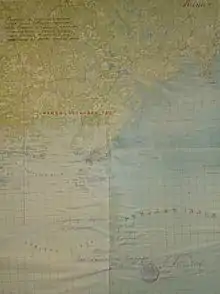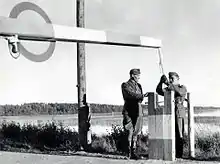Porkkala Naval Base
Porkkala Naval Base was a Soviet naval base during 1944–1956 in the municipalities of Kirkkonummi, Ingå and Siuntio at the Porkkala peninsula which is located only 30 kilometers (19 mi) west of Helsinki, the Finnish capital.
The area was leased to the Soviet Union according to the 1944 signed Moscow Armistice[1] between Finland, the Soviet Union and the United Kingdom. The area was returned to Finland in 1956, and currently hosts a Finnish naval base Upinniemi.

History
At the end of the Second World War the Soviet Union secured the rights of lease to a naval base at Porkkala, in accordance with the Moscow armistice agreement that ended the Continuation War, between Finland and the Soviets on September 19, 1944. Porkkala thus replaced the peninsula of Hanko, which had been leased to the Soviets as a naval base in 1940–41. A large area centered on the peninsula, including land from the municipalities of Kirkkonummi, Siuntio and Inkoo and almost the entire area of Degerby, was leased to the USSR from 29 September 1944, ten days after the armistice.[2] It was immediately placed under a military commander, Neon Vasilyevich Antonov (1907–1948), who remained in office till June 1945, when he was transferred to command the Amur River flotilla, in preparation for the war against Japan.[3]
On 1 November 1944, the headquarters and other assets of the 55th Rifle Division were converted into the 1st Mozyr Red Banner Naval Infantry Division of the Baltic Fleet at Oranienbaum. Its subordinate units were renumbered. The 107th Rifle Regiment became the 1st Regiment, the 111th Rifle Regiment became the 2nd Regiment, and the 228th became the 3rd Regiment. The 185th Tank Regiment became the 1st Tank Regiment and the 84th Artillery became the 1st Artillery. The division formed the garrison of the Porkkala Naval Base. In 1948, the division became the 1st Machine Gun Artillery Division of the Baltic Fleet. The 1st Regiment became the 51st Machine Gun Artillery Regiment, the 2nd Regiment the 54th, and the 3rd Regiment the 57th. The 1st Tank Regiment was renumbered as the 194th and the 1st Artillery was renumbered as the 414th. The 53rd and 60th Machine Gun Artillery Regiments were added to the division after being formed from ground units. The division included 16,000 soldiers, occupying 280 machine gun and 208 artillery bunkers. In 1955, negotiations for a Soviet withdrawal began, and the division began disbanding in August 1955. The process was completed in January 1956, when what remained of the division was disbanded at the Bobochinsky Camp in the Leningrad Military District.[4]
According to the armistice of 1944, the area was leased to the Soviet Union for 50 years. On February 10, 1947, the Paris peace treaty reaffirmed the Soviet Union's right to occupy this area until 1994.
No Soviet civilian administration was set up, the USSR simply administered it through the military commander of Porkkala, a post held until 26 January 1956 by Sergey Ivanovich Kabanov (1901–1973), the former Commander of Hanko naval base.
While under Soviet control, Finnish passenger trains running between Helsinki and Turku were allowed to use the line through the area. However all train windows had to be closed with shutters, and photography was prohibited.[5]
Although the Soviet lease for Porkkala had been conceded for 50 years, an agreement was reached to return it earlier. The agreement was signed on September 19, 1955, exactly 11 years after the armistice, and control of the area was handed back to Finland on January 26, 1956. This may be attributed to the Finno-Soviet Treaty of 1948, the conditions of which made the naval base unnecessary.
At present, the Porkkala area houses one of the main bases of the Finnish Navy, located in Upinniemi, near Porkkala proper.

References
- Heninen, Andrew. "Armistice Agreement". heninen.net.
- "Sixty years ago: Parliament within range of Soviet guns". Helsingin Sanomat. Archived from the original on December 15, 2013.
- "Антонов Неон Васильевич". www.warheroes.ru.
- Feskov et al 2013, pp. 143–144.
- "The iron curtain comes down, and "the world's longest railway tunnel" is created". Helsingin Sanomat. Archived from the original on 2012-10-20.